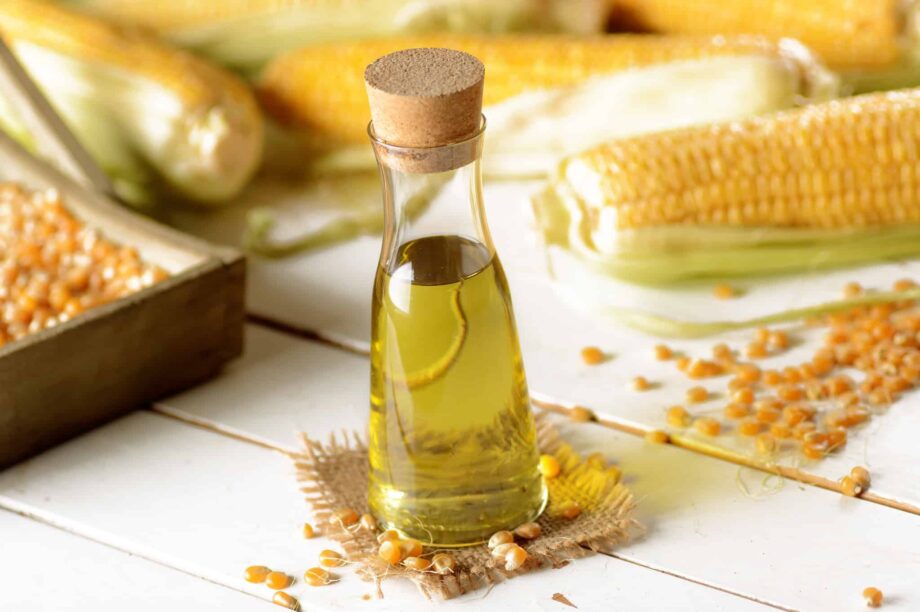Understanding Corn Oil
What is Corn Oil?
Corn oil is extracted from the germ of corn kernels through a process that typically involves crushing and pressing. It is then refined to remove impurities and enhance its stability and shelf life.
Composition of Corn Oil
Corn oil primarily consists of unsaturated fatty acids, including linoleic acid (omega-6) and smaller amounts of monounsaturated and saturated fats. It also contains vitamin E and phytosterols, which contribute to its nutritional profile.
Chapter 2: Nutrition Profile of Corn Oil
Fatty Acid Composition
Corn oil is rich in linoleic acid, an essential omega-6 fatty acid that plays a role in cell membrane structure, inflammation regulation, and overall health. However, excessive consumption of omega-6 fatty acids relative to omega-3 fatty acids may contribute to inflammation and other health issues.
Vitamin E Content
Corn oil is a good source of vitamin E, a fat-soluble antioxidant that helps protect cells from oxidative damage and supports immune function. The presence of vitamin E in corn oil contributes to its stability and shelf life.
Health Benefits of Corn Oil
Heart Health
Some research suggests that replacing saturated fats with unsaturated fats, such as those found in corn oil, may help reduce the risk of heart disease by lowering LDL cholesterol levels and improving overall lipid profiles.
Antioxidant Properties
The vitamin E content of corn oil provides antioxidant properties, helping to neutralize free radicals and reduce oxidative stress, which may contribute to chronic diseases and aging.
Skin and Hair Health
Topical application of corn oil may help moisturize and nourish the skin and hair due to its emollient properties and vitamin E content. However, further research is needed to confirm its efficacy for these purposes.
Potential Downsides of Corn Oil
Omega-6 to Omega-3 Ratio
Corn oil is high in omega-6 fatty acids, which, when consumed in excess relative to omega-3 fatty acids, may promote inflammation and increase the risk of chronic diseases such as cardiovascular disease, arthritis, and certain cancers.
Processing Methods
The refining process used to produce corn oil may involve high heat, chemical solvents, and deodorization, which can strip away natural nutrients and antioxidants and introduce harmful compounds such as trans fats and free radicals.
Common Uses of Corn Oil
Cooking and Frying
Corn oil’s high smoke point makes it suitable for high-heat cooking methods such as frying, sautéing, and baking. Its neutral flavor and light texture make it a popular choice for a wide range of culinary applications.
Salad Dressings and Marinades
Corn oil’s mild flavor and liquid consistency make it an ideal base for homemade salad dressings, marinades, and vinaigrettes, providing a smooth texture and allowing other flavors to shine through.
Chapter 6: Frequently Asked Questions (FAQs)
Is corn oil healthy?
While corn oil contains unsaturated fats and vitamin E, its high omega-6 fatty acid content and processing methods raise concerns about its overall healthfulness. Moderation and mindful consumption are key factors in determining its role in a healthy diet.
Can corn oil be used for deep frying?
Yes, corn oil’s high smoke point makes it suitable for deep frying and other high-heat cooking methods. However, it’s essential to use fresh oil, monitor temperatures carefully, and avoid reusing oil to minimize the formation of harmful compounds.
Is corn oil better than olive oil?
Olive oil is often touted for its health benefits due to its high monounsaturated fat content and antioxidant properties. While corn oil can be part of a healthy diet when used in moderation, olive oil is generally considered a healthier option due to its superior fatty acid profile and minimal processing.
Does corn oil raise cholesterol levels?
Corn oil’s impact on cholesterol levels depends on various factors, including individual genetics, overall diet, and lifestyle habits. While some research suggests that corn oil may help lower LDL cholesterol levels, it’s essential to consume it as part of a balanced diet and healthy lifestyle for optimal heart health.
Is corn oil safe for people with allergies?
Individuals with corn allergies should avoid corn oil and products derived from corn to prevent allergic reactions. Additionally, those with sensitivities to omega-6 fatty acids or concerns about processing methods may choose alternative oils.
Can corn oil be used as a substitute for butter in baking?
Yes, corn oil can be used as a substitute for butter or other solid fats in baking recipes to reduce saturated fat content and achieve a lighter texture. However, adjustments may be needed to account for differences in moisture and flavor.
How should corn oil be stored?
Corn oil should be stored in a cool, dark place away from direct sunlight and heat sources to prevent oxidation and rancidity. It’s essential to seal the bottle tightly after each use and check for signs of spoilage, such as off odors or flavors, before consumption.
Conclusion
Corn oil offers a neutral flavor, high smoke point, and versatility in cooking, making it a popular choice for culinary applications. While it contains unsaturated fats and vitamin E, its high omega-6 fatty acid content and processing methods raise questions about its healthfulness. By understanding its nutrition profile, potential benefits and downsides, and common uses, you can make informed decisions about incorporating corn oil into your diet. Moderation, mindful consumption, and attention to overall dietary patterns are key factors in promoting optimal health and well-being.
- The Ultimate Review Top Delta 8 Gummies Unveiled By Golden Goat CBD - April 23, 2024
- Sweet Serenity: Navigating the World of Just Delta CBD Gummies - April 23, 2024
- Whole Grain vs. Whole Wheat Whats the Difference? - April 13, 2024
